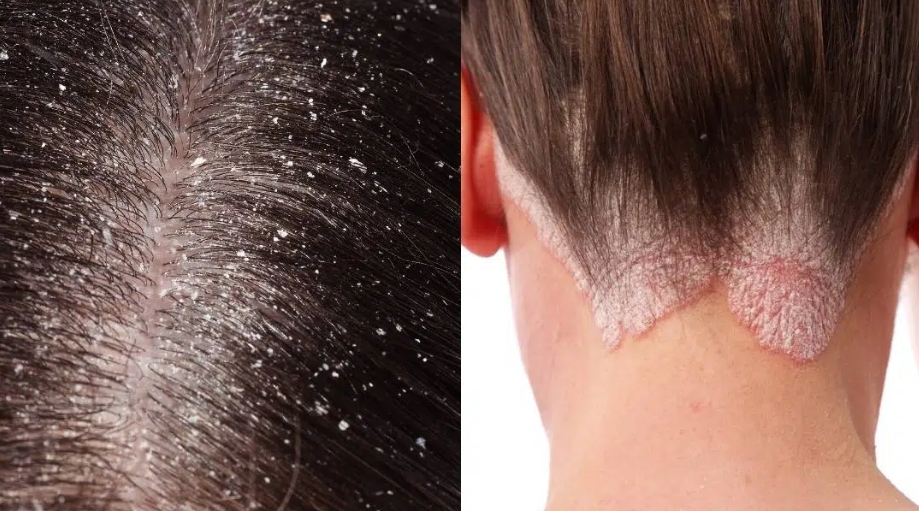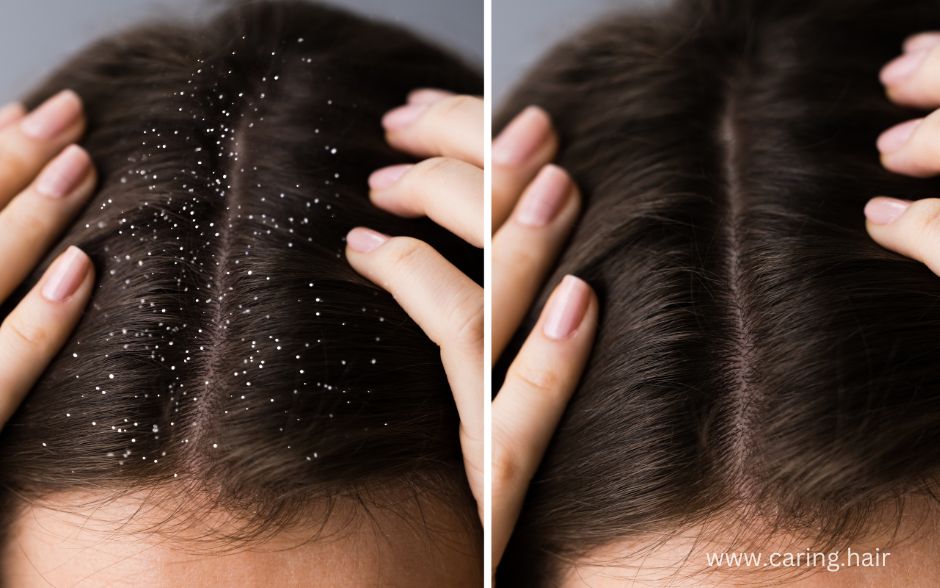It’s snowing. Already, you think to yourself. It’s not even winter yet.
You knock the white flakes off your shoulders: High time to bring out the anti-dandruff shampoo again.
If you suffer from an itchy scalp and flakes, chances are you have dandruff. 1 in 2 people will experience it once in their lifetime. But did you know that there is a difference between oily dandruff and dry dandruff and thus whether anti-dandruff shampoo helps or not? I tell you more about it below.
Help! I have an itchy scalp and flaky skin.
Oh dear, that’s not nice. But did you know that 50 per cent of people suffer from dandruff at some point? You’re not the only one. Not by a long shot.
Okay, but what causes it?
You can get itchy and flaky scalp for several reasons:
Your scalp is dehydrated (dry dandruff), for example because you have naturally dry skin, you use hair products that clean too much or you wash your hair too often
You suffer from seborrheic dermatitis (oily dandruff), either because your skin is naturally oily or because you do not wash your hair often enough
You are allergic to perfume, cocamidopropyl or another substance and use hair products containing it
You have psoriasis, where you get thick patches on your scalp,
You have another scalp condition, such as folliculitis or ringworm

How do you know what causes an itchy scalp and flakes?
You probably have dandruff: oily or dry dandruff. 1 in 5 of all people suffer from this.
What is the difference between oily and dry dandruff?
Oily dandruff, also known as seborrhoeic eczema, occurs mostly in people with reduced immunity who have greasy hair easily and/or who do not wash their hair often enough.
Dry dandruff occurs in people with a dehydrated scalp, because your sebaceous glands do not produce enough grease or because you use products that dry out your skin.
And the other possible causes?
A perfume allergy is much less common than dandruff: in 1 to 2 in 100 people. The best way to determine whether you have a perfume allergy is to use hair products without perfume and then see if your symptoms go away.
When it comes to psoriasis: 2.4 in 100 suffer from it, according to the Central Bureau of Statistics. You can recognise psoriasis by thick scaly patches on your skin.
But: only a doctor can make an official diagnosis
So if you have scalp complaints: see your GP. Or even better: get referred to a dermatologist. They can determine, through examination, exactly where it is you are suffering from.
What can you do about seborrheic eczema?
In seborrhoeic eczema, sebum and a Malessezia fungus play an important role. By reducing the amount of sebum on your scalp, by not feeding the fungus and by using fungicidal hair products, you reduce eczema.
BUT: it unfortunately never goes away completely, you will have to keep treating it.
Some things you can do:
- Wash your hair with a mild shampoo if it is oily, even if it is every day
- Use a shampoo with fungicidal properties, such as the Scalp Therapy Exfoliating Shampoo from Neofollics
- Use only MCT oil or mineral oil on your scalp; other oils feed the fungus
- Use hair products that contain sebum-inhibiting ingredients such as Niacinamide or Green Tea
- Eat fewer sugars and carbohydrates. They promote inflammation and stimulate your sebum production
- Sleep on a satin or bamboo pillowcase and change it every day
- Use a scalp mask to care for your scalp, such as the Neofollics Scalp Therapy Nourishing Mask
What are good tips against dry scalp?
- Do not wash your hair more often than necessary: only when it is dirty or greasy
- Wash your hair with a mild shampoo to avoid drying out your scalp
- Apply oil to your scalp regularly, e.g. before washing it
- Use hair products with oil and so-called humectants (aloe vera gel, glycerine, sugar complexes) to soften and moisturise your scalp
- Avoid hair products with drying alcohol (e.g. alcohol denat.) and sulphates in them. Fatty alcohols are fine
- See if itching and flaking decrease if you use products without perfume
- Use a scalp serum to care for your scalp.
Which shampoo is good for an itchy scalp?
A mild shampoo anyway. In other words, one without sulphates and with caring ingredients in it. Then you won’t dry out your scalp. This is also important if you suffer from oily dandruff (seborrheic eczema): if you use shampoo that is too strong, your hair may become oily even faster.
Otherwise, it depends on the cause:
Does your scalp itch because you are allergic to perfume, cocamidopropyl or another substance?
Then the solution is obvious: use a shampoo without those ingredients. This is also recommended if you suffer from psoriasis.
Do you suffer from oily scalp and seborrheic eczema?
Then wash with a mild shampoo scrub with antifungal ingredients in it. For example, Neofollics’ Scalp Therapy Exfoliating Shampoo. It removes flakes, soothes itching and combats bacteria and fungus. The shampoo also nourishes your scalp.
Are you itching because your scalp is very dry?
Then use a mild shampoo that also contains plenty of oil and moisturising ingredients such as aloe vera gel, glycerine or sugar complexes.
Recap
In the vast majority of cases, oily dandruff (seborrheic eczema) or dry dandruff is the cause of an itchy scalp and flakes. Oily dandruff involves an oily scalp, while dry dandruff involves a dry scalp. A cause such as perfume allergy or psoriasis is less common.
If you suffer from an itchy scalp and flakes, use a mild shampoo. If the cause is seborrheic eczema, wash your hair more often and use a shampoo with an anti-fungal effect for this purpose.
Is the itching and flaking caused by dry dandruff? Then wash your hair as little as possible and make sure you use hair products with lots of oil and moisturising ingredients in them.
Do you suffer from a perfume allergy or suffer from psoriasis? Then use a shampoo without perfume and cocamidopropyl betaine.
